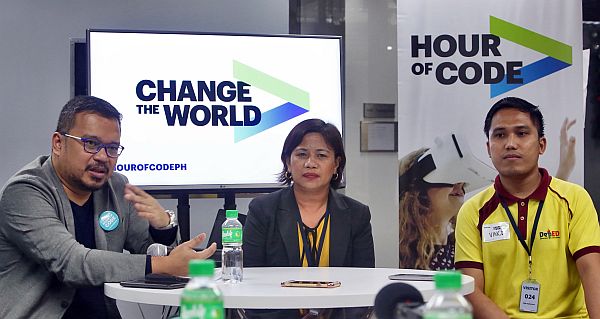Accenture to reach out to more schools for STEM

Arvin Yason, Accenture’s Global Delivery Network for Technology in the Philippines’ managing director (left) discusses the company’s “Hour of Code” event together with Dr. Rose Marie Novabos, Oprra National High School (ONHS) principal, and Vicente Impel, ICT coordinator of ONHS during the Dec. 9 press briefing at the firm’s office in IT Park.
CDN PHOTO/JUNJIE MENDOZA
GLOBAL management consulting firm, Accenture, is eyeing to expand its partnerships with schools in Cebu in a bid to entice more students to embrace computer and science, technology, engineering and math (STEM) skills.
Arvin Yason, managing director at Accenture’s Global Delivery Network for Technology in the Philippines, said there is a large demand for computer science professionals globally with the need growing even more every year.
“In the United States, there is a need for half a million computer-related jobs, but the country only produces 40,000 graduates with the necessary skills each year. We have a similar issue in the Philippines,” he said during a media conference for the Hour of Code event in Cebu City last Saturday.
Hour of Code was launched in 2013 by Code.org, a non-profit organization dedicated to expanding access to computer science and increasing participation by women and underrepresented minorities.
The program reaches millions of students through a one-hour introduction to coding and computer science.
For the third straight year, the outsourcing firm has teamed up with Code.org for Hour of Code and other STEM-related educational initiatives.
In Cebu, Accenture began with a partnership with French non-government organization, Passerelles numériques (PN) Philippines, to reach out to college students. It was only in 2016 when they reached out to Cebu City National Science High School and this year to OPRRA National High School (ONHS).
Yason said they may eventually expand their partnerships with more high schools in Cebu in the future and even cascade the initiative down to elementary students, which is already being practiced in Manila.
For this year, 53 students from ONHS were given a coding tutorial on artificial intelligence (AI) through which they might be able to better understand the concept using a fun and interactive game.
The school was also a beneficiary of the company’s corporate citizenship efforts in 2016, having received 30 computer units which eventually led to the implementation of its Information Communications Technology (ICT) program.
Dr. Rose Marie Novabos, ONHS principal, said the turnover of computer units had given her hope that her students will be able to find great opportunities in the future using their computer-related skills.
According to data from the Commission on Higher Education (CHED), business- and medicine-related courses are the most popular in college, with those that finished degrees in these fields accounting for 45 percent of the total number of graduates in 2014.
CHED data from 2013, meanwhile, showed that those who took engineering and technology-related courses only made up 11 percent of the 564,769 graduates that year. Those that took courses in math and natural sciences only accounted for 0.53 percent and 1.17 percent, respectively.
STEM graduates have many career options to choose from including becoming engineers, computer programmers and web developers, which are only few of the most in-demand jobs in the Information Technology-Business Process Management (IT-BPM) industry.
Vicente Impel, ICT coordinator at ONHS, said that his students did not have prior knowledge on programming before having been chosen as beneficiaries for Hour of Code this year.
When the ICT program was implemented last year, the students were only taught basic computing skills. Nonetheless, the students from grades 7 to 10, readily accepted the challenges their new learning experience would bring.
Disclaimer: The comments uploaded on this site do not necessarily represent or reflect the views of management and owner of Cebudailynews. We reserve the right to exclude comments that we deem to be inconsistent with our editorial standards.
